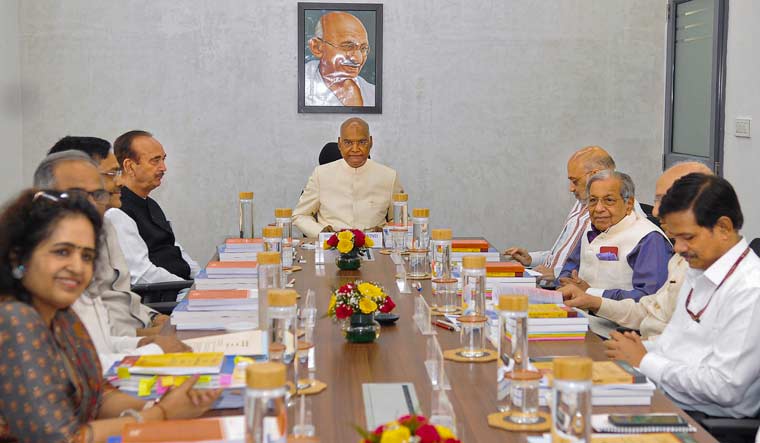The high-level committee headed by former president Ram Nath Kovind to study simultaneous parliamentary, assembly and local bodies polls submitted the report to President Draupadi Murmu on Thursday. This comes five months after the Centre formed the six-member panel to study the 'One nation, one election' plan.
The report, which has eight volumes and runs into over 18,000 pages, is said to suggest that conducting simultaneous polls will help the country economically and avoid inconvenience to the public, in terms of time and energy, considering that some states spent over 200 days a year for multiple elections to panchayats and local bodies and state assembly.
It suggests holding joint polls in 2029 and has considered "procedural and logistical" issues related to this. It is also said to have examined multiple aspects of holding simultaneous elections, including its implications on crime rate and education outcomes.
It also includes a paper by the chairperson of the 15th Finance Commission NK Singh and International Monetary Fund’s Prachi Mishra on the economic viability of simultaneous polls.
The panel also suggested a roadmap for the same, which includes amending at least five articles of the Constitution and a singular electoral roll for holding Lok Sabha, state assembly and local body polls.
The panel is also said to have considered the German model of a constructive vote of no-confidence but later dropped it because they found it against the tenets of Indian democracy, The Indian Express quoted sources. The German model enables bringing a no-confidence motion against the incumbent if the Parliament express its lack of confidence in the person. However, it can be done only by electing a successor by the vote of a majority.
The panel, set up last September last, was entrusted with examining and making recommendations for holding simultaneous elections to the Lok Sabha, state assemblies, municipalities and panchayats, keeping in view the existing constitutional framework.
Besides Kovind, the panel also has members including Home Minister Amit Shah, former leader of the opposition in the Rajya Sabha Ghulam Nabi Azad, former Finance Commission chairman N K Singh, former Lok Sabha Secretary General Subhash Kashyap and senior advocate Harish Salve. Leader of the Congress in Lok Sabha Adhir Ranjan Chowdhury was also made a member of the panel but he declined, dubbing the committee as a total eyewash. Law Minister Arjun Ram Meghwal is a special invitee to the panel.
The committee used multiple means to gather feedback, including through its website from various stakeholders, including former chief election commissioners.
Though it rote to the Election Commission (EC) asking for a meeting at least twice, the EC did not meet the committee but sent its written response.









